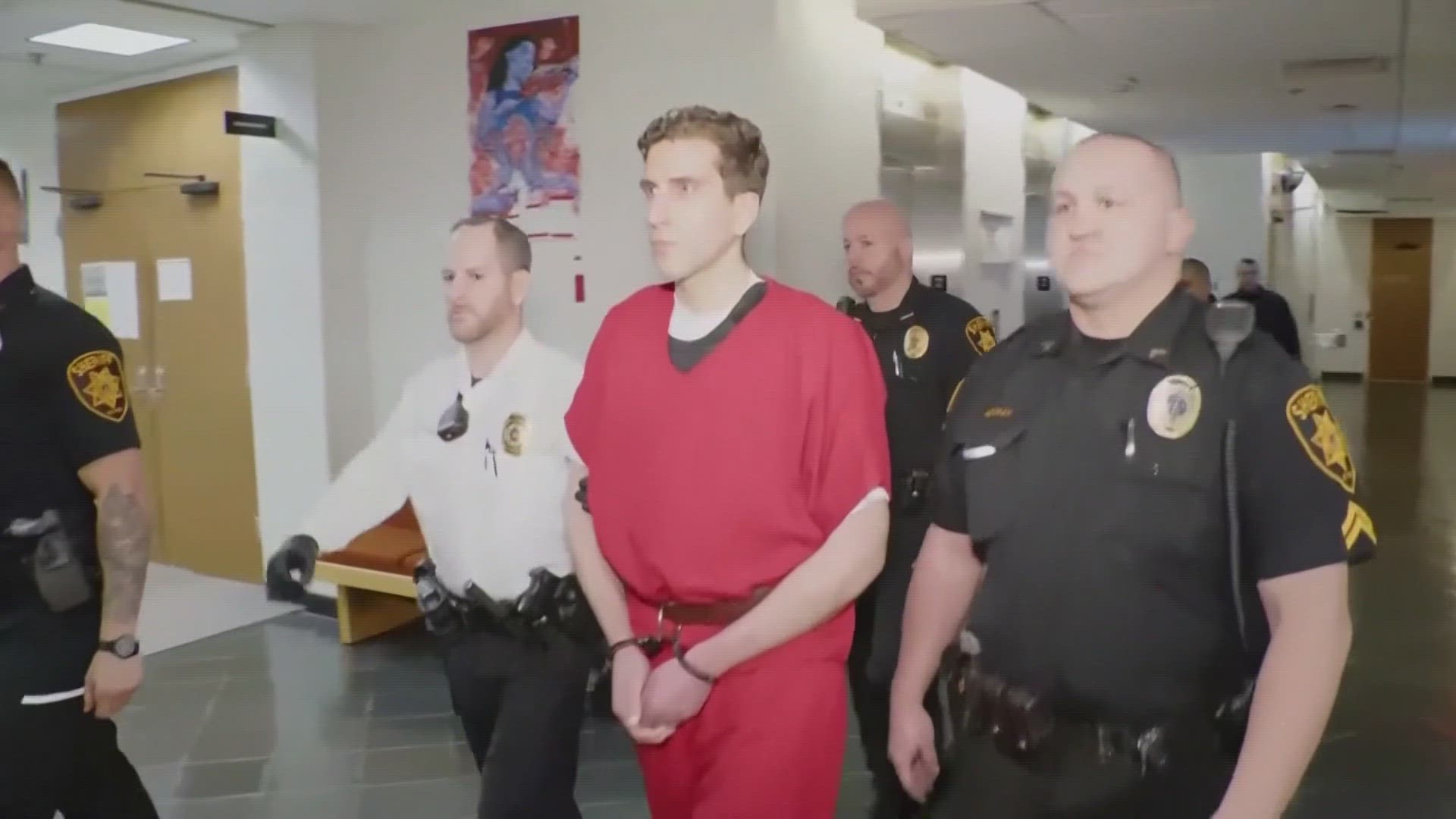SEATTLE — The state of Idaho intends to seek the death penalty against Bryan Kohberger, who is accused of stabbing four University of Idaho students to death in November.
Latah County Prosecuting Attorney Bill Thompson submitted a notice of the state’s intent to the court Monday.
In mid-May, a grand jury indicted Kohberger, 28, on four counts of first-degree murder and burglary in the deaths of Madison Mogen, Kaylee Goncalves, Xana Kernodle and Ethan Chapin on Nov. 13, 2022. A judge entered a not-guilty plea on Kohberger’s behalf after he stood silent at his arraignment on May 22.
In the notice filed Monday, Thompson wrote that “statutory aggravating circumstances” appear to exist in the case, which is required for the state to prove in order for the death penalty to be a possibility. Thompson listed five circumstances, including that:
- multiple murders appeared to be committed at the same time,
- the murder was “especially heinous, atrocious or cruel,”
- the defendant showed “utter disregard for human life,”
- the murder was committed in the perpetration of other charges, including burglary,
- and/or that the defendant showed “a propensity to commit murder” that will result in a “continuing threat to society.”
Thompson said the state did not receive any mitigating circumstances that would prohibit them from seeking the death penalty. Mitigating factors could include mental health evidence and family or behavioral history. The defense could argue these factors in the penalty phase if Kohberger were to be found guilty.
The state had 60 days from when Kohberger’s plea was entered on May 22 to decide whether it would seek the death penalty.
The decision to seek the death penalty is at the discretion of the prosecutor.
In Idaho, the death penalty is considered the maximum penalty when it comes to defendants who either plead guilty or are found guilty of first-degree murder. Lethal injection would be the legal form of capital punishment.
Kohberger's trial is set to begin on Oct. 2. However, legal experts said the date ould be pushed back.
Legal experts have said pursuing the death penalty will slow down the trial process, as prosecutors need to demonstrate that the crime is so egregious that the death penalty is warranted. Kohberger's defense will also need to prepare a "death defense." According to the American Bar Association, capital attorneys must hire their own investigators, consult with experts, conduct a mental health evaluation and evaluate the prosecution's evidence.
Between 1998 and 2013, it took seven months longer to find a verdict in capital cases than in noncapital cases, according to a 2014 Idaho state report.
Although prosecutors can argue aggravating circumstances during the trial, the death penalty won't be decided until the penalty phase.
In Idaho, the jury -- which is the same jury as the "guilt phase" -- needs to unanimously return a death penalty verdict to sentence a defendant to death. Otherwise, the defendant receives an automatic sentence of life in prison.
The death penalty is rare in Idaho. Of the 40 defendants sentenced to death since 1977, just three people have been executed, according to the state report.
Idaho murder investigation and court case
Mogen, Goncalves, Kernodle and Chapin were found dead in an off-campus house in the early morning hours after another roommate called the police. Latah County Coroner Cathy Mabbutt said the four students were stabbed to death in their beds.
The slayings shocked the rural Idaho community and neighboring Pullman, Washington, where Kohberger was a graduate student studying criminology at Washington State University.
Police released few details about the investigation until after Kohberger was arrested at his parents’ home in eastern Pennsylvania early Dec. 30, 2022. Court documents detailed how police pieced together DNA evidence, cellphone data and surveillance video that they say links Kohberger to the slayings.
Investigators said traces of DNA found on a knife sheath inside the home where the students were killed match Kohberger, and that a cellphone belonging to Kohberger was near the victims’ home on a dozen occasions before the killings. A white sedan allegedly matching one owned by Kohberger was caught on surveillance footage repeatedly cruising past the rental home around the time of the killings.
But defense attorneys have filed a motion asking the court to order prosecutors to turn over more evidence about the DNA found during the investigation, the searches of Kohberger's phone and social media records, and the surveillance footage used to identify the make and model of the car. The motion is one of several that will be argued during the hearing Tuesday afternoon.

